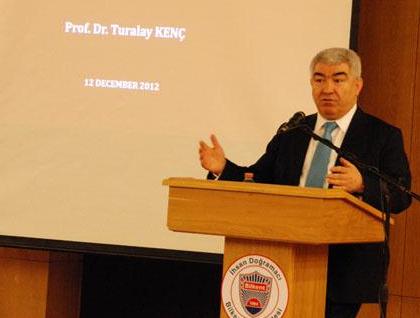Impact of Eurozone Crisis Discussed by Central Bank Vice Governor
Last week, the GE 441 FEASS Interdisciplinary Senior Project Course on the European Union hosted Prof. Turalay Kenç, vice governor of the Turkish Central Bank. Professor Kenç delivered a lecture at FEASS entitled "The European Debt Crisis and Its Impact on the Emerging Market Economies."
Prof. Kenç started his presentation by underlining the importance of the eurozone crisis, making reference to its continuing prominence on the agendas of international decision-making platforms. He reiterated former european Central Bank President Jean-Claude Trichet's statement that the European Union continues to be at the epicenter of the worst financial crisis since WWII. Prof. Kenç argued that weak growth rates throughout the union as well as governance problems in the monetary union were the main underlying reasons of this crisis. The lack of a supervisory and regulatory agency and an insurance fund also contributed to the crisis.
Prof. Kenç pointed out that financial systemic risk, namely balance sheet recession, an insolvency problem and a liquidity problem, is acute in the eurozone. He suggested that a fiscal union with an increasing growth rate and a primary surplus could remedy the insolvency problem.
 In the last part of the symposium, Mr. Kenç focused on the impact of the eurozone crisis on the emerging market economies, with particular reference to Turkey as a special case. He noted that there are three channels through which emerging markets are affected by the European Union crisis: the funding channel, the trade channel and the expectations channel. While arguing that all three channels have affected many emerging markets negatively, he also showed several figures indicating that in Turkey's case increased capital adequacy ratio and decreased bad loan ratio patterns have been emerging since the beginning of the eurozone crisis. He also noted that the share of EU27 countries in the export market has decreased, which is a good sign in Turkey's case.
In the last part of the symposium, Mr. Kenç focused on the impact of the eurozone crisis on the emerging market economies, with particular reference to Turkey as a special case. He noted that there are three channels through which emerging markets are affected by the European Union crisis: the funding channel, the trade channel and the expectations channel. While arguing that all three channels have affected many emerging markets negatively, he also showed several figures indicating that in Turkey's case increased capital adequacy ratio and decreased bad loan ratio patterns have been emerging since the beginning of the eurozone crisis. He also noted that the share of EU27 countries in the export market has decreased, which is a good sign in Turkey's case.
Prof. Kenç concluded his discussion by answering questions from those attending the seminar.
